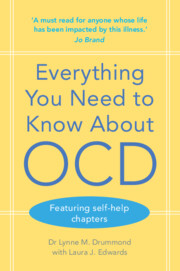Book contents
- Everything You Need to Know about OCD
- Reviews
- Everything You Need to Know about OCD
- Copyright page
- Contents
- Preface
- Acknowledgements
- 1 What Is OCD and Is It Really a Problem?
- 2 Who Gets OCD and How Would Anyone Know if They Had It?
- 3 Types and Presentation of OCD
- 4 Drug Treatment
- 5 Exposure and Response Prevention for OCD
- 6 Children and Adolescents with OCD
- 7 Old Treatments, Modern Developments, New Research, and Potential Treatments for the Future
- 8 Other Conditions Which Appear Similar to OCD
- 9 What Can Family and Carers Do to Help a Person with OCD?
- 10 What Can You Do to Help Cope with Your OCD?
- 11 General Principles of Treatment
- 12 How to Better Manage Your Symptoms Before and During Treatment
- 13 Overcoming Fears of Contamination
- 14 Fear of Harm to Self or Others Due to Failure to Act
- 15 Fear of Harm to Self or Others Due to Your Own Actions (or Thoughts)
- 16 Overcoming ‘Taboo’ Obsessive Thoughts
- 17 Loss of Something (Objects or Part of ‘Self’)
- 18 Overcoming Obsessive-Compulsive Slowness, Perfectionism and Symmetry
- 19 Overcoming Obsessive Ruminations (Sometimes Known as ‘Pure O’)
- 20 When the Treatment Doesn’t Go According to Plan or Even If It Does, What to Do Next
- Appendix
- Glossary
- Resources
- References
- Index
9 - What Can Family and Carers Do to Help a Person with OCD?
Published online by Cambridge University Press: 27 May 2022
- Everything You Need to Know about OCD
- Reviews
- Everything You Need to Know about OCD
- Copyright page
- Contents
- Preface
- Acknowledgements
- 1 What Is OCD and Is It Really a Problem?
- 2 Who Gets OCD and How Would Anyone Know if They Had It?
- 3 Types and Presentation of OCD
- 4 Drug Treatment
- 5 Exposure and Response Prevention for OCD
- 6 Children and Adolescents with OCD
- 7 Old Treatments, Modern Developments, New Research, and Potential Treatments for the Future
- 8 Other Conditions Which Appear Similar to OCD
- 9 What Can Family and Carers Do to Help a Person with OCD?
- 10 What Can You Do to Help Cope with Your OCD?
- 11 General Principles of Treatment
- 12 How to Better Manage Your Symptoms Before and During Treatment
- 13 Overcoming Fears of Contamination
- 14 Fear of Harm to Self or Others Due to Failure to Act
- 15 Fear of Harm to Self or Others Due to Your Own Actions (or Thoughts)
- 16 Overcoming ‘Taboo’ Obsessive Thoughts
- 17 Loss of Something (Objects or Part of ‘Self’)
- 18 Overcoming Obsessive-Compulsive Slowness, Perfectionism and Symmetry
- 19 Overcoming Obsessive Ruminations (Sometimes Known as ‘Pure O’)
- 20 When the Treatment Doesn’t Go According to Plan or Even If It Does, What to Do Next
- Appendix
- Glossary
- Resources
- References
- Index
Summary
This chapter will examine what family members and carers can do to help someone with OCD. In the case of the parents of a person with OCD, the natural reaction is to try to prevent their offspring from experiencing extreme anxiety and distress. This reaction means they can often get caught up being asked to participate in OCD compulsions and rituals and also to obey many of the ‘rules’ which people with OCD may devise to avoid setting off OCD thoughts. Despite the fact that this compliance with the OCD rituals is done by the carers with the best of intentions, it serves to actually worsen the OCD symptoms over time. It can often be useful for carers to realise that they are the people without OCD, and thus they need to set the ‘ground rules’ of what they will or will not tolerate and do in their own home. However, in many cases, this is easier said than done. First, old habits die hard. Second, it can be extremely difficult to resist stepping in if a loved-one is highly distressed. This will be explored in this chapter as well as possible solutions.
Throughout this chapter, it is emphasised that the safety of any children, other family members, and the person with OCD is paramount. When an individual suffers from OCD, they can become very distressed and agitated when having extreme obsessive symptoms. A minority of these people may become violent at these times. Violence is never acceptable, and family, carers, and friends have a duty to themselves and also to the person with OCD to keep themselves safe at all times. This may require families to request help from the police in extreme cases. As stated at the beginning, children are the paramount consideration. They may be harmed not only by violent actions but also by being asked to engage in OCD activities and being required to have a restricted life rather than be outside playing with friends or inviting friends to their home. This can be a difficult area for the OCD sufferer and those around them, but it is vital that the welfare of any children is always considered first and foremost.
- Type
- Chapter
- Information
- Everything You Need to Know About OCD , pp. 157 - 167Publisher: Cambridge University PressPrint publication year: 2022

